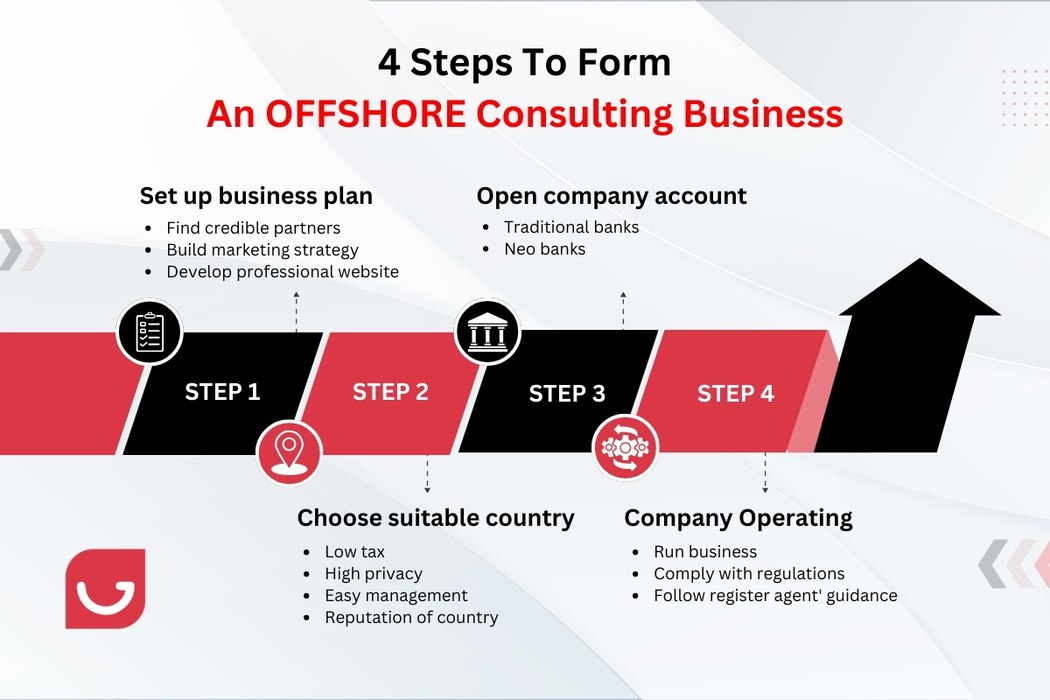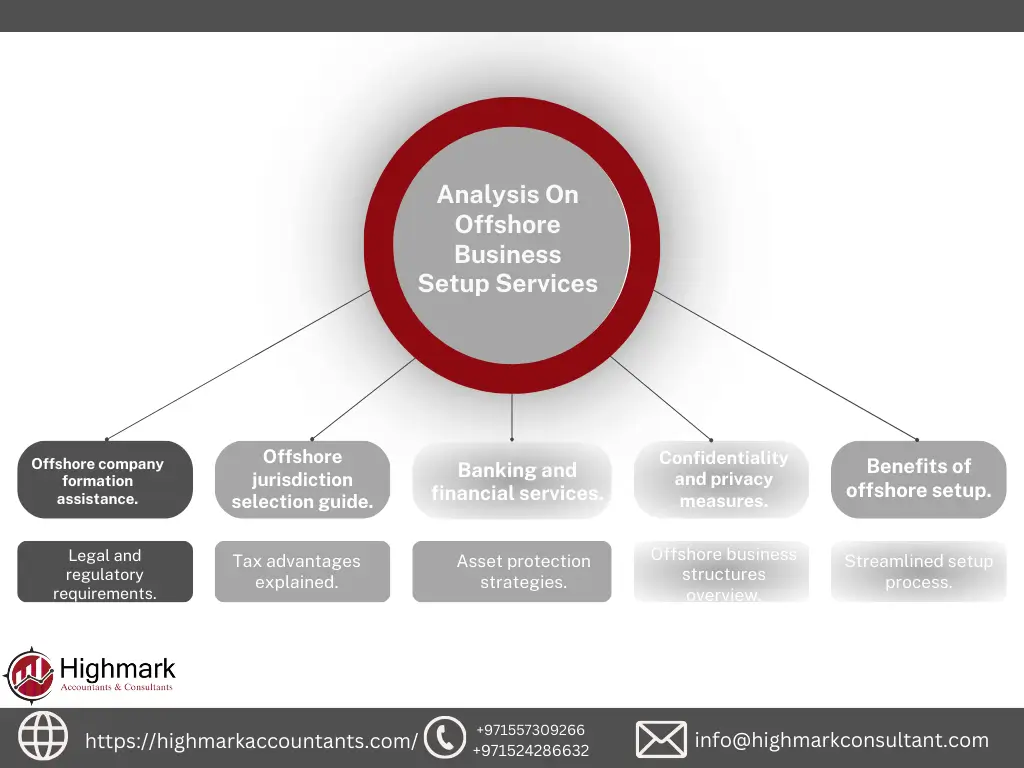How Offshore Business Formations Work: A Detailed Review for Business Owners
Offshore business formations can provide considerable benefits for entrepreneurs seeking tax obligation optimization and property protection. The process includes several vital steps, starting with careful territory selection and extensive documentation prep work. Involving specialist services is essential for conformity. Lots of neglect the recurring duties that adhere to preliminary enrollment. Comprehending these intricacies can make a significant distinction in leveraging offshore chances effectively. The next actions are necessary for long-lasting success.
Comprehending Offshore Business: What They Are and Why They Matter
The idea of offshore firms may appear facility, recognizing their basic nature and significance is important for both individuals and companies looking for to maximize their monetary strategies. Offshore companies are entities signed up outside the individual's nation of residence, commonly in jurisdictions that supply desirable regulative settings. These businesses can offer various advantages, such as tax obligation optimization, possession defense, and improved privacy.
For business owners, developing an offshore company can facilitate global trade, lower functional prices, and expand market reach. Additionally, overseas firms typically enable for structured compliance with worldwide guidelines. Individuals might additionally use overseas frameworks to safeguard individual properties from political or financial instability in their home countries. Inevitably, the appeal of offshore companies lies in their capacity to boost monetary versatility and supply critical advantages in an increasingly interconnected global economy - Offshore Company Formations. Recognizing their operational framework and advantages is vital for making informed choices
Picking the Right Territory for Your Offshore Firm
Picking the proper territory for an overseas business is essential for making best use of tax benefits and making sure conformity with local guidelines. Various jurisdictions supply differing tax obligation motivations and regulative settings that can greatly affect service procedures. As a result, a mindful assessment of these aspects is necessary for educated decision-making.
Tax Obligation Advantages Introduction
When taking into consideration the establishment of an overseas business, recognizing the tax obligation advantages connected with different jurisdictions is important. Different places use one-of-a-kind advantages, such as reduced or absolutely no company tax obligation rates, which can greatly improve productivity. Some territories provide tax motivations for particular kinds of companies, drawing in business owners looking for decreased tax obligation responsibilities. In addition, particular nations enforce positive tax obligation treaties that reduce dual tax on worldwide earnings, ensuring that businesses maintain even more profits. The option of jurisdiction likewise affects value-added tax obligation (VAT) and other regional tax obligations. Business owners must assess these variables meticulously to select a location that lines up with their service objectives, enhancing tax obligation performance while continuing to be compliant with worldwide regulations.
Regulatory Atmosphere Considerations
Picking the right jurisdiction for an offshore firm requires a comprehensive understanding of the regulative environment, as different countries enforce differing levels of conformity and governance. Business owners have to review factors such as legal frameworks, tax guidelines, and reporting commitments. Territories like the British Virgin Islands and Cayman Islands are usually preferred for their business-friendly regulations and minimal coverage requirements. Conversely, some countries might impose strict regulations that might make complex operations and boost costs. In addition, the political security and online reputation of a jurisdiction can affect the lasting stability of the offshore firm. Mindful factor to consider of these regulatory aspects is important to guarantee that the picked territory aligns with the business's functional requirements and tactical objectives.
Functional Preparing the Needed Documents
Preparing the required documents is an important step in the offshore firm development procedure. Entrepreneurs should gather numerous lawful and identification records to facilitate their company's facility in a foreign territory. Typically, this includes a detailed business strategy outlining the business's goals and operational strategies. Additionally, individual identification files, such as keys or motorist's licenses, are needed from the business's shareholders and supervisors.
In most cases, evidence of address, like utility bills or bank declarations, is essential to confirm the identifications of the involved celebrations. Moreover, specific forms determined by the territory, consisting of application forms for enrollment, must be completed precisely. Some territories may additionally require a statement of the nature of service tasks and compliance with regional regulations. Thoroughly preparing these records assures a smoother enrollment procedure and helps minimize prospective delays or difficulties, ultimately establishing a solid structure for the overseas entity.
Involving Specialist Services for Offshore Development
Engaging specialist solutions in offshore development can greatly enhance the performance and performance of the procedure. Business owners often deal with intricacies that can be overwhelming, making experienced support very useful. Expert companies focusing on overseas formations provide a wide range of expertise concerning territory choice, business framework, and regional market conditions.
These professionals can assist in preparing crucial documentation, making certain accuracy and compliance with specific needs. They also assist streamline communication with neighborhood authorities, lowering the chance of delays or misunderstandings. Furthermore, professional solutions can use understandings into calculated advantages, such as tax advantages and property security, customized to the entrepreneur's details requirements.
Navigating Regulatory Conformity and Legal Demands
Comprehending the governing landscape is necessary for entrepreneurs beginning on overseas business developments. Compliance with worldwide regulations and local laws is essential to stay clear of lawful mistakes. Each jurisdiction has specific requirements regarding business registration, reporting, and taxation, which have to be extensively investigated.
Business owners must familiarize themselves with the policies regulating corporate structure, ownership, and operational practices in the chosen offshore place. In addition, anti-money laundering (AML) and understand your consumer here are the findings (KYC) regulations frequently apply, calling for appropriate documentation and verification processes.
Involving with legal professionals who concentrate on offshore services can supply very useful support on maneuvering with these complexities. Making sure compliance not just secures the company from potential lawful problems however also enhances integrity with companions, capitalists, and regulators. By sticking to the prescribed legal structures, entrepreneurs can effectively utilize the benefits of offshore business formations while lessening risks linked with non-compliance.
Establishing Up Financial and Financial Accounts

As soon as an ideal financial institution is determined, entrepreneurs typically need to prepare and send numerous documents, consisting of proof of identity, business enrollment documents, and a description of the desired organization activities. (Offshore Company Formations)
Some banks might also require a minimum down payment to open up an account. Business owners must be prepared to address questions pertaining to the source of funds and company operations. By completely understanding the banking landscape and following the bank's demands, business owners can safeguard their overseas firm has seamless access to essential financial services for effective operation.
Preserving Your Offshore Business: Continuous Duties and Best Practices
Preserving an overseas company includes several recurring responsibilities that are essential for compliance and operational stability. Secret aspects consist of sticking to annual compliance needs, maintaining exact economic documents, and recognizing tax commitments. These components are vital for guaranteeing the company's longevity and lawful standing in its jurisdiction.
Annual Compliance Requirements
While establishing an overseas business offers countless benefits, it also involves recurring responsibilities that can not be ignored. Annual conformity needs differ by jurisdiction but generally include submitting annual returns and monetary statements to neighborhood authorities. Business must likewise pay yearly fees, which can consist of enrollment renewals and tax obligations, depending upon the location. On top of that, many jurisdictions require preserving a local rep and a licensed office. Failing to abide by these policies can cause charges, consisting of penalties and even dissolution of the company. Entrepreneurs must likewise be aware of any type of adjustments in neighborhood regulations that may influence their compliance obligations. Remaining educated and organized is crucial for keeping the benefits of an offshore firm while satisfying lawful responsibilities effectively.
Keeping Financial Records
Conformity with annual requirements is only part of the continuous obligations related to overseas company monitoring. Maintaining exact economic records is important for guaranteeing transparency and responsibility. Business owners have to systematically record all purchases, including earnings, costs, and possessions. This method not just help in interior decision-making however additionally prepares the firm for possible audits from regulative authorities.
Consistently upgrading financial statements, such as profit and loss accounts and annual report, is important for tracking the firm's economic health and wellness. Making use of audit software can streamline this procedure, making it simpler to preserve and produce records compliance. Additionally, business owners should consider seeking specialist accountancy solutions to assure adherence to regional laws and finest practices, thereby securing the stability and online reputation of their offshore procedures.

Tax Obligation Obligations Overview
Steering through the intricacies of tax obligation obligations is necessary for the effective management of an overseas firm. Business owners need to comprehend the tax obligation laws of both their home country and the territory where the offshore entity is established. Compliance with neighborhood tax regulations is vital, as failing to stick can lead to penalties or lawful concerns. Regularly submitting required tax returns, even when no tax might be owed, is commonly called for. Additionally, maintaining current and accurate monetary records is important for showing conformity. Inquiring from tax specialists knowledgeable visit about worldwide tax regulation can aid browse these commitments successfully. By carrying out best techniques, business owners can ensure that their offshore operations stay legally compliant and monetarily practical.

Regularly Asked Concerns
How much time Does the Offshore Business Formation Refine Usually Take?
The overseas company formation procedure generally varies from a few days to numerous weeks. Factors influencing the timeline include jurisdiction, documents requirements, and responsiveness of monetary and lawful institutions associated with the setup.
What Are the Expenses Related To Maintaining an Offshore Business?
The expenses related to preserving an offshore company can differ commonly. They typically include annual enrollment fees, compliance prices, accounting services, and feasible legal charges, relying on the territory and specific service tasks entailed.
Can I Open Up a Personal Checking Account for My Offshore Firm?
Opening up an individual savings account for an offshore firm is normally not permitted. Offshore accounts need to be company accounts, mirroring the next page firm's tasks, consequently abiding by regulations and guaranteeing correct economic administration and lawful responsibility.
Exist Constraints on Foreign Possession of Offshore Companies?

What Takes place if I Fail to Follow Offshore Regulations?
Failure to comply with overseas guidelines can bring about severe fines, consisting of large fines, loss of service licenses, and prospective criminal costs. Additionally, non-compliance may result in reputational damages and troubles in future organization operations.
Offshore firms are entities registered outside the individual's nation of home, frequently in territories that supply beneficial regulatory environments. Selecting the ideal territory for an overseas firm is crucial for taking full advantage of tax benefits and making certain conformity with local policies. When considering the establishment of an offshore firm, comprehending the tax obligation advantages associated with various jurisdictions is essential. Picking the right territory for an overseas company requires a comprehensive understanding of the regulative environment, as different nations impose differing levels of compliance and administration. Furthermore, the political security and credibility of a territory can influence the long-term stability of the overseas company.